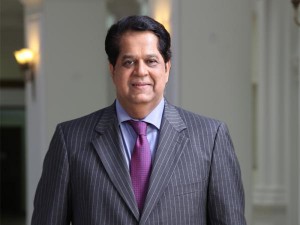
India has named private sector banker K.V. Kamath as head of the New Development Bank, the so-called Brics bank of the big emerging economies of Brazil, Russia, India, China and South Africa, according to government officials in New Delhi.
The bank, one of a group of new institutions backed by China and reflecting Beijing’s increasing political and economic influence in Asia and beyond, will be based in Shanghai, while member states, starting with India, will take turns to lead it.
Mr Kamath, aged 67, is seen as an uncontroversial choice and a safe pair of hands as the bank’s debut head.
A pillar of India’s corporate establishment, he is non-executive chairman of India’s ICICI, the country’s largest private sector lender. Having started his career with the bank, Mr Kamath led ICICI as chief executive from 1996 to 2009, overseeing its rapid expansion and modernisation.
The new Brics bank was described in the Financial Times by George Magnus, associate at the China Centre of the University of Oxford, as a sort of “clone institution” of the International Monetary Fund.
China, awash with ready cash that it is ready to spend on infrastructure investments worldwide in a show of “soft power”, has also raised hackles in the US with its new Asian Infrastructure Investment Bank, and a “One Belt, One Road” project to create a modern “silk road” through central and south Asia.
Mr Kamath’s appointment drew speculation among observers that other heavyweight economic figures in India had declined the role, notably Reserve Bank of India governor Raghuram Rajan, who had denied any interest in the post.
“For a long time the rumour was that Raghu [Rajan] would be lumped with this, and we can at least be grateful that this did not happen, given how badly India needs him,” said one figure with ties to the government of Prime Minister Narendra Modi.
The power and relevance of the role leading the Chinese-dominated institution has also been questioned in India.
“While an Indian is the head, the bank-roller is clearly China, and so it isn’t clear that any really top-level people would even want this job. So they had to get someone safe, a sort of emeritus figure,” the person added.
Mr Kamath is known for his unfailingly upbeat views about India’s own economic development, a faith that friends say rarely wavered even in private, in spite of rapid declines in the country’s rate of growth over recent years.
The banker has previously served as president of the Confederation of Indian Industries, a prominent trade group, and as non-executive director for other various companies.
But he also has experience of international financial institutions because of his stint at the Asian Development Bank, the Japanese-led lender, and he may need to use his diplomatic skills to smooth over the tensions between Beijing and its rivals in Tokyo and Washington.
In addition to his role building up ICICI, Mr Kamath’s image as a deft corporate troubleshooter was underlined in 2011, when he was appointed chairman of one-time bellwether IT group Infosys, with the job of turning round the struggling outsourcer.